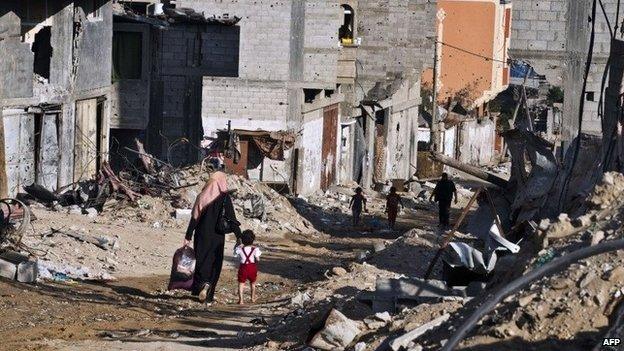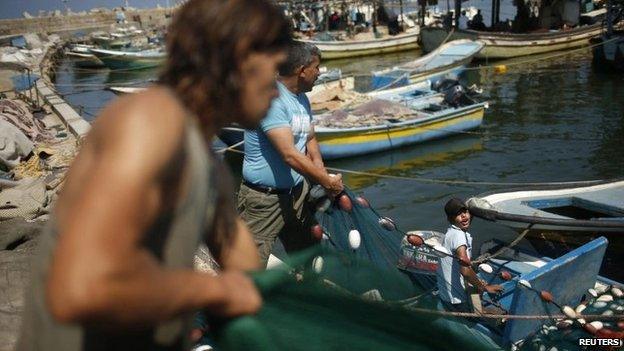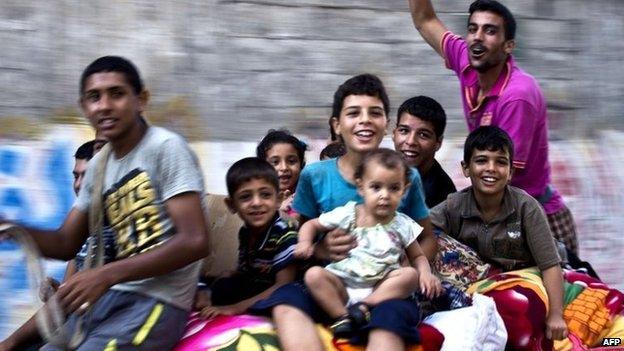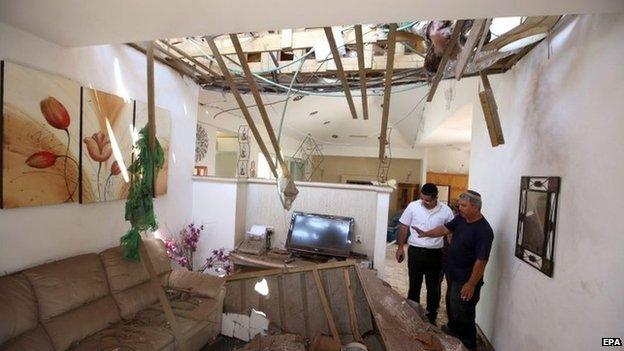Gaza ceasefire: Thousands return home as calm returns
- Published
The BBC's Quentin Sommerville says life is beginning to return to normal in Gaza
Thousands of Palestinians have begun to return to their homes after an open-ended truce with Israel was agreed.
Celebrations carried on after dark in Gaza City on Tuesday, as people poured into the battered streets, clapping and singing, after the truce was announced.
On Wednesday, fishing boats ventured out to sea as restrictions were eased.
The ceasefire brokered by Egypt brings to an end 50 days of fierce fighting in which more than 2,200 people have been killed, most of them Palestinians.
Hamas, the militant Islamist movement that dominates Gaza, said the agreement with Israel represented a "victory for the resistance".
Israeli Prime Minister Benjamin Netanyahu also claimed victory.
In a televised news conference, he said Hamas has been "hit hard" and threatened an even tougher response should there be so much as a "sprinkle" of rocket fire from Gaza.
Israeli Intelligence Minister Yuval Steinitz told the BBC's Hard Talk programme that the reoccupation of Gaza had been "seriously considered" during the conflict.
It would be the "only alternative" if Hamas were to resume rocket fire into Israel, he said.
Returning home
Life in Gaza was returning to normal on Wednesday, as thousands of people began returning to their homes.
Engineers meanwhile struggled to repair infrastructure damaged by Israeli air strikes and shellfire.
The BBC's Kevin Connolly says while the streets were packed with celebrations during the earlier hours of the ceasefire, questions are now being raised by the price that was paid for it.

Gaza City's Shejaiya district, which Israel said was a "terror fortress", was devastated by the fighting

Fishermen welcomed the extension of the zone in the Mediterranean where they can operate

At the scene: Quentin Sommerville, BBC News, Gaza
The beach here in Gaza is almost unrecognisable. It is busy again. There are children playing in the surf; fishermen are out tending to their nets. It is something we have not seen for a very long time.
It is more than 12 hours since the ceasefire was declared. Overnight, we did not hear any shelling from Israel or any rockets being fired from Gaza.
The big question is whether this ceasefire will hold. The previous eight did not, lasting for anything from a few hours to a number of days.
US Secretary of State John Kerry has said the ceasefire is "an opportunity, not a certainty". It does not promise peace. It allows normal life to resume in Gaza. A lot of work needs to be done to ensure this is a lasting truce.


More than a quarter of Gaza's population has been displaced by the fighting

Thousands of rockets were fired at Israel, killing civilians and causing damage to homes
In Israel, sirens warning of incoming rocket fire were silent and the military said there had been no violations of the ceasefire since it took effect.
UN Secretary General Ban Ki-moon welcomed the end of hostilities, but warned that a brighter future for civilians who have been affected depends on a sustainable truce.
"After 50 days of profound human suffering and devastating physical destruction, any violations of the ceasefire would be utterly irresponsible," he said.
'Peace at any price'
The ceasefire deal calls for the relaxing of Israeli and Egyptian border controls to allow humanitarian supplies and construction materials into Gaza, and the widening of the territory's fishing zone.
Israel-Gaza conflict
8 July - Israeli offensive began
5,226
air strikes on Gaza
4,591
rockets and mortars fired at Israel
-
2,104 people killed in Gaza - UN estimates 69% of deaths are civilians
-
6 civilians killed in Israel (including one Thai national)
-
67 Israeli soldiers killed
Both sides have agreed to address more contentious issues - including Palestinian demands for a seaport in Gaza and the release of Hamas prisoners in the West Bank, and Israel's demand for Gaza's militants to be disarmed - at indirect talks that should begin in Cairo within a month.
Israeli media reported that Mr Netanyahu had chosen not to put Egypt's ceasefire proposal to a vote in his security cabinet because of opposition from ministers who wanted to continue the offensive on Gaza.
Israeli minister Dr. Yuval Steinitz: Military reoccupation of Gaza was "seriously considered'
President Mahmoud Abbas declared his acceptance of the truce on state TV
Israel launched Operation Protective Edge on 8 July with the stated aim of ending rocket fire.
At least 2,140 people, most of them civilians, have been killed in Gaza, according to the Palestinian health ministry. Another 11,000 people have been injured.
The Israeli authorities say 64 Israeli soldiers have been killed, along with six Israeli civilians and a Thai national.
The UN says more than 17,000 buildings in Gaza have been destroyed or severely damaged, and that there are at least 475,000 internally displaced people (IDPs), more than a quarter of the territory's population.